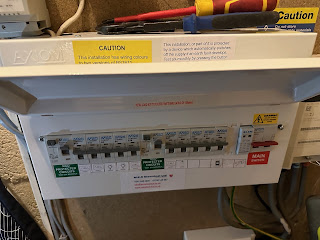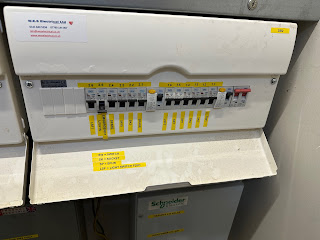Your Trusted Electricians in Glasgow: Comprehensive Services, 24/7 Emergency Support, and Quality You Can Rely On
When it comes to finding reliable electricians in Glasgow, it's important to choose a company that is experienced, certified, and dedicated to customer satisfaction. Whether you're a homeowner, landlord, tenant, or business owner, having a trustworthy electrician you can rely on is essential for safety, compliance, and peace of mind. At Wes Electrical, we pride ourselves on offering top-tier electrical services throughout Glasgow and the surrounding areas. From EICR testing and PAT testing to fault finding and full rewires, our team is equipped to handle any electrical issue, no matter how big or small.
Why Choosing the Right Electrician Matters
Electricity is the lifeblood of modern homes and businesses. From lighting and heating to appliances and security systems, reliable electrical systems ensure smooth day-to-day operations. However, when something goes wrong, it can disrupt your life, pose safety risks, or even damage your property. That’s why hiring qualified electricians in Glasgow is crucial.
Working with professionals ensures:
Compliance with UK wiring regulations (BS7671)
Reduced risk of electrical fires and accidents
Accurate diagnostics and long-lasting solutions
Insurance coverage in case of unexpected incidents
Our Core Services
At Wes Electrical, we specialize in a broad range of electrical services tailored to meet the diverse needs of clients across Glasgow. Here's a closer look at what we offer:
1. Emergency Electricians in Glasgow
Emergencies can happen anytime – a power cut in the middle of the night, a tripped fuse that won't reset, or sparks from a faulty socket. That's why we offer 24/7 emergency electrical services in Glasgow. Our rapid-response team is available around the clock, ensuring help is just a phone call away. With a quick diagnosis and efficient repair, we minimize downtime and restore your power safely.
2. EICR Testing Glasgow (Electrical Installation Condition Reports)
Whether you’re a landlord or a property manager, regular EICR testing is now a legal requirement. Our certified electricians carry out detailed EICR inspections in Glasgow to identify potential hazards and ensure your property meets all safety standards. You’ll receive a comprehensive report that outlines any necessary remedial work, helping you stay compliant and protect your tenants.
3. EPC Certificates (Energy Performance Certificates)
In addition to EICRs, we help landlords and homeowners with Energy Performance Certificates. An EPC rates the energy efficiency of your property and offers recommendations for improvement. It’s mandatory for renting or selling a property, and our assessors ensure you get a fast, hassle-free certificate at a competitive rate.
4. PAT Testing (Portable Appliance Testing)
For landlords and businesses, PAT testing is essential to maintain electrical safety. We conduct thorough PAT testing in Glasgow for offices, rental properties, schools, and other establishments. Each appliance is tested, labelled, and recorded to ensure complete compliance.
5. Fault Finding and Repairs
Flickering lights? Tripping circuit breakers? Burning smells from sockets? These are signs of electrical faults that shouldn't be ignored. Our Glasgow-based electricians specialize in fault finding and resolving issues before they become dangerous. With state-of-the-art diagnostic tools, we identify the root cause quickly and fix it efficiently.
6. Full and Partial Rewires
Old or unsafe wiring can pose serious risks. If your property has outdated electrics, we offer both full and partial rewiring services. This is especially important for older homes or those undergoing renovation. Our team ensures your wiring meets the latest safety regulations and can handle modern electrical loads.
7. Consumer Unit Upgrades
Upgrading your fuse box to a modern consumer unit with RCD protection enhances both safety and functionality. We offer consumer unit replacements across Glasgow, giving you added protection from electric shocks and fire hazards.
Areas We Serve in Glasgow
We're proud to offer electrical services across all parts of Glasgow, including:
West End
City Centre
Southside (Shawlands, Giffnock, Pollokshields)
East End (Dennistoun, Shettleston)
North Glasgow
Surrounding towns (Paisley, Renfrew, Clydebank, Bearsden, and beyond)
No matter where you're located, our electricians are only a short drive away. We're proud to be a local company with deep roots in the Glasgow community.
Why Wes Electrical?
There are plenty of electricians in Glasgow, but here's why we stand out:
Fully Qualified & Insured: All our electricians are NICEIC approved and fully insured.
Local & Trusted: We have a strong reputation throughout Glasgow built on word-of-mouth referrals.
Transparent Pricing: No hidden costs. Just fair, upfront quotes.
Emergency Support: Available 24/7 when you need us most.
Customer-Focused: We treat your home or business with respect, tidying up after ourselves and minimizing disruption.
Modern Techniques: We use the latest tools and technologies for diagnostics, testing, and repairs.
Iain Jamieson is an approved electrician in Glasgow Owner of WES Electrical since 2006
Testimonials
"Wes Electrical came out to my flat in the West End at 2am after my fuse board tripped and wouldn’t reset. They arrived in 25 minutes and had me back up and running fast. Professional, friendly, and affordable!" — Lisa M., Glasgow
"I needed an EICR and EPC fast to rent out my property in Paisley. The team handled everything quickly and explained the reports clearly. Would 100% recommend them." — Michael T., Landlord
Need an Emergency Electrician in Glasgow? Call Us Now
Electrical emergencies can’t wait. Whether it’s midnight or midday, we’re ready to help. Our emergency electricians cover all of Glasgow, arriving promptly to diagnose and repair issues on the spot.
Don’t wait until it’s too late. Contact Wes Electrical today for:
Immediate emergency support
EICR and EPC certificates
Rewiring and repairs
Professional, friendly service from Glasgow locals
Final Thoughts
Electrical safety is not something to take lightly. Whether you're dealing with a sudden fault or planning an upgrade, you need experienced electricians you can trust. Wes Electrical is proud to be the go-to choice for homeowners, landlords, and businesses across Glasgow. We bring expertise, professionalism, and dedication to every job, ensuring your electrics are safe, compliant, and future-proof.
Get in touch with us today and let’s power up your property the right way.






